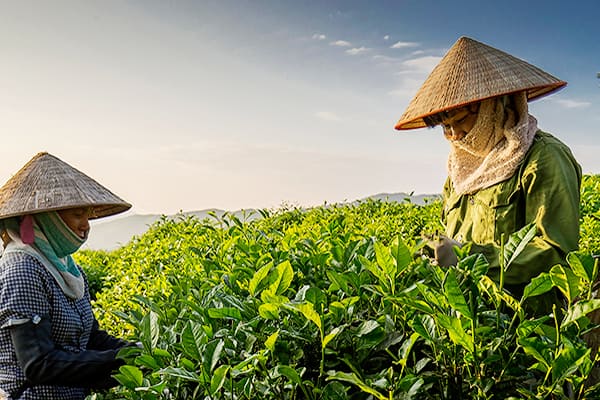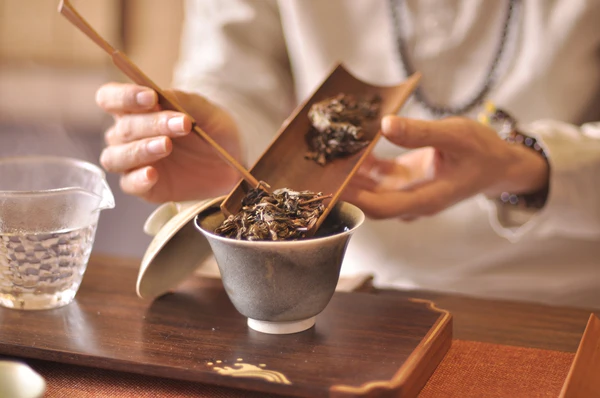Vietnamese tea culture is steeped in history and tradition, dating back to ancient times when the art of brewing tea was considered a refined and contemplative practice.
This Southeast Asian country boasts a diverse range of teas, each with its unique flavor, aroma, and health benefits. From bold black teas to delicate white teas, Vietnamese tea culture offers a sensory experience that is truly unique.
In this article, we’ll take a sip into the world of Vietnamese tea culture and explore the different types of tea, brewing methods, and cultural significance.
Types of Vietnamese Tea:
Vietnam is home to a variety of teas, each with its distinct characteristics and flavors. Here are some of the most popular types of Vietnamese tea:
- Green tea: This tea is made from unfermented tea leaves, which are picked and then quickly steamed or pan-fried to stop the oxidation process. Green tea has a mild flavor and is rich in antioxidants, making it a healthy choice.
- Black tea: Also known as red tea in Vietnam, black tea is made from fully fermented tea leaves. It has a bold, robust flavor and is often enjoyed with milk and sugar.
- Oolong tea: Oolong tea is a semi-fermented tea that falls somewhere between green and black tea. It has a complex, layered flavor and is often brewed using the traditional gongfu method.
- White tea: This tea is made from young tea buds and is the least processed of all tea types. It has a delicate, subtle flavor and is often served as a calming tea.
- Lotus tea: A unique and aromatic tea, lotus tea is made by placing tea leaves inside the petals of lotus flowers. As the flowers dry, they infuse the tea leaves with their fragrance, giving the tea a distinct floral aroma.
Vietnamese Tea vs. Vietnamese Coffee
| Aspect | Vietnamese Tea | Vietnamese Coffee |
|---|---|---|
| Flavor Profile | Delicate, complex flavors with subtle notes of natural herbs and spices | Rich, bold flavor with a strong caffeine kick |
| Preparation | Steeped in hot water using a Vietnamese filter or brewed using the traditional gongfu method | Brewed using a French drip filter and mixed with sweetened condensed milk |
| Caffeine Content | Moderate caffeine content compared to coffee | High caffeine content |
| Cultural Significance | Associated with hospitality, friendship, and Buddhist traditions | Associated with socializing and enjoying leisure time |
| Popular Types | Lotus tea, black tea, oolong tea | Traditional drip coffee, egg coffee, coconut coffee |
While both Vietnamese tea and coffee have their own unique flavor profiles and cultural significance, coffee is more popular and widely consumed in Vietnam. However, tea remains an important part of Vietnamese culture, particularly in Buddhist traditions where tea is seen as a symbol of hospitality and friendship. Whether you prefer a rich cup of coffee or a delicate cup of tea, Vietnam has something to offer for every taste preference.
Brewing Methods:
Vietnamese tea culture places a strong emphasis on the art of brewing tea. Here are some popular methods of brewing tea in Vietnam:
- Gongfu tea: This method involves using a small clay teapot and brewing multiple infusions of tea in short bursts. The tea is steeped for just a few seconds before being poured into small cups, allowing the drinker to experience the different layers of flavor in each infusion.
- Vietnamese filter coffee style: This method involves using a small filter that sits on top of a cup. The tea leaves are placed inside the filter, and hot water is poured over them, allowing the tea to steep and drip into the cup below. This method is popular for making black tea, but can be used for other tea types as well.
- Western-style brewing: This method involves brewing tea using a teapot and allowing it to steep for several minutes before pouring it into a cup. It is a less formal method of brewing tea, but still allows for a rich, full-bodied flavor.
Cultural Significance:
Tea has played a significant role in Vietnamese culture for centuries. It is often enjoyed during social gatherings, such as weddings and festivals, and is considered a symbol of hospitality and friendship. In Vietnamese tradition, tea is also believed to have health benefits, such as aiding digestion and boosting the immune system.
Vietnamese tea culture also has a deep connection to Buddhism, which has influenced the art of tea brewing and the philosophy behind it. In Vietnamese Buddhist temples, tea ceremonies are often held as a way of promoting mindfulness and relaxation.
Comparison of Vietnamese and Chinese Tea Culture:
Vietnamese and Chinese tea cultures share some similarities but also have distinct differences. Here is a comparison of some key aspects of both cultures:
| Aspect | Vietnamese Tea Culture | Chinese Tea Culture |
|---|---|---|
| Types of Tea | Green, black, oolong, white, lotus | Green, black, oolong, white, yellow, dark |
| Brewing Methods | Gongfu, Vietnamese filter coffee style, Western-style | Gongfu, Grandpa style, Kung Fu tea |
| Cultural Significance | Hospitality, friendship, Buddhism | Hospitality, ceremony, Taoism |
While both Vietnamese and Chinese tea cultures share some common types of tea, such as green, black, oolong, and white, Chinese tea culture also has unique types of tea, including yellow and dark tea. Similarly, while both cultures share some common brewing methods, such as gongfu style, Chinese tea culture also has unique brewing methods, such as Grandpa style and Kung Fu tea.
In terms of cultural significance, while both cultures view tea as a symbol of hospitality, friendship, and ceremony, Vietnamese tea culture has a deeper connection to Buddhism, which is reflected in its tea ceremonies held in Buddhist temples. Chinese tea culture, on the other hand, has a strong association with Taoism, and the tea ceremony is often seen as a way of promoting harmony and balance in life.
Where To Buy Vietnamese Tea?
If you’re interested in trying Vietnamese tea, there are several options available for purchasing it. Here are a few places where you can buy Vietnamese tea:
- Vietnamese tea shops: You can find many tea shops in Vietnam that specialize in selling traditional teas, including lotus tea, oolong tea, and black tea. Some of these shops may also offer tea tastings and demonstrations.
- Online retailers: There are several online retailers that sell Vietnamese tea, such as Amazon and Etsy. These retailers often offer a wide variety of teas, including rare and hard-to-find blends. Here are some online retailers where you can purchase Vietnamese tea:
- Amazon (https://www.amazon.com/Vietnamese-Tea/s?k=vietnamese+tea): Amazon offers a variety of Vietnamese teas from different sellers. You can find popular Vietnamese tea brands like Trung Nguyen and Yen Tu.
- Etsy (https://www.etsy.com/market/vietnamese_tea): Etsy has a selection of Vietnamese tea sellers offering different blends and types of tea. Some sellers may also offer handmade tea accessories and other related products.
When purchasing Vietnamese tea from online retailers, make sure to read reviews and compare prices to ensure you are getting the best quality and value for your money.
- Specialty stores: Many specialty food stores and supermarkets carry a selection of Vietnamese teas. These stores may also offer other Vietnamese food and beverage products, allowing you to explore the cuisine and culture of Vietnam in a deeper way.
- Local tea festivals: Many Vietnamese cities host tea festivals and events where you can purchase teas directly from local producers. These festivals are a great way to learn about Vietnamese tea culture and to try a variety of teas from different regions.
When purchasing Vietnamese tea, it’s important to look for high-quality teas that are fresh and have been stored properly. Additionally, it’s important to pay attention to brewing instructions to ensure that you’re getting the best flavor and aroma from your tea.
With a little bit of research and exploration, you can find the perfect Vietnamese tea to suit your taste preferences and to enjoy as a part of your daily routine.
Conclusion:
Vietnamese tea culture is a rich and diverse world of aromas, flavors, and traditions. From the bold and robust flavors of black tea to the delicate and subtle notes of white tea, Vietnamese tea culture offers a unique sensory experience that is sure to delight any tea lover.
By understanding the different types of tea, brewing methods, and cultural significance, you can gain a deeper appreciation for this ancient and refined art of tea brewing. So, next time you sip a cup of Vietnamese tea, take a moment to savor its flavors and immerse yourself in the world of Vietnamese tea culture.
Originally posted 2023-05-11 01:37:04.






Visited Vietnam a few years ago. Even though its coffee dominates the morning routine, Vietnamese tea is also top-notched!
@Jackson: It’s true! It’s great to be both tea and coffee lover in this country.